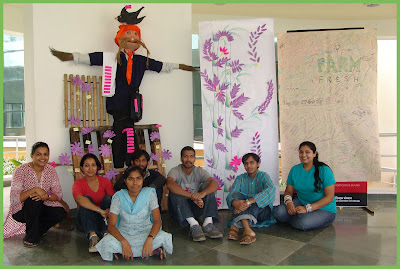Undersdtanding the Known Universe: Assignment on Sustainability and Social Equity as a Design Challange in IndiaImages: Students sharing the work presentation at the end of assignment one in the DCC course at Bangalore.
The students of NID R & D Centre at Bangalore from the Retail Experience and Digital Experience disciplines were assigned the task of exploring the areas of three key sectors of employment to discover how the supply chain could be strengthened by design approaches to ensure both sustainability as well as social equity across the following sectors:
1. Handmade Products and Handlooms team with their models

2. Farm Fresh Produce team with their models

3. Dairy and Poultry Products team with their models

The groups were asked to brainstorm and then categorise the various dimensions of these sectors so as to capture the known factors and attributes so as to understand the sector as a system which could then be inmproved from the stated goal of achieving both sustainability as well as social equity in the age of rapid globalisation and urbanisation that is sweeping the country today. This understanding was then to be used to develop design opportunities at a leter stage in the Design Concepts and Concerns course at the Bangalore Centre of NID. The two new disciplines at Bangalore are doing this course for the first time and the attempt is also being made to integrate the areas of focus of both groups at the Centre as well as the interersts of the students in each group. Groups were formed by choosing volunterr coordinators and they in turn selected the teams to make these multi-doisciplinary as well as with a gender balance in each group to get the required variety on the teams.
Image: Detail of one of the models by the Fresh Farm Produce Group

Each group made their brainstorming sessions with a lot of passion and committment and then spent a good deal of time in categorising their findings over a period of two days of intense activity. The teams then prepared a structure that made sense to them and based on the agreed structure they developed a rich metaphor to capture all the dimensions of their assigned sectors.
Rashmi, who is in Ahmedabad, shared a wonderful set of links from the
Open University in the UK on Systems Modelling and Diagramming and the students have been requested to explore these links to study the theory of modelling and diagramming types through the rich multi-media presentations available at these links below:
What are Spray Diagrams?What are Rich PicturesWhat are Systems Maps?What are Influence DiagramsWhat are Multi-Cause DiagramsWhat are Sign GraphsThese are not to be treated as frozen methods to be followed but as a guide to understanding and each experience will show the student their own way forward and give then an ability to make their own models and diagrams which are best suited to their task as well as one that can be achieved within the constraints of the skill sets available to the group with whom they are working.
Image: Teachers explaining the next assignment dealing with meetings with experts as well as strategies for gathering insights from the field.



_cr_s.jpg)














